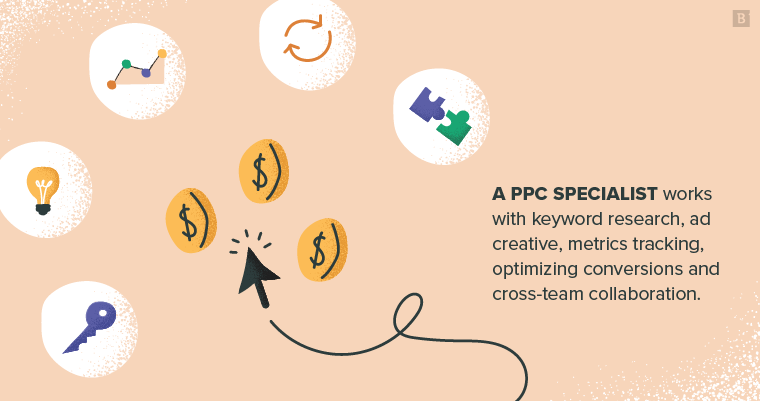What makes an expert PPC specialist in the dynamic field of digital marketing? In addition to a strong grasp of keyword research and landing page design, leadership capacity and certifications like Google Ads Certification can help differentiate ideal candidates. Skilled PPC specialists are essential for creating successful PPC campaigns that drive conversions and actionable insights.
“You down with PPC? Yeah, you know me!”
As the search marketing landscape continues to evolve and thrive, companies are diversifying their digital strategies. From content marketing to social influencer campaigns, there is no shortage of marketing tactics to take. Digital marketing specialists leverage platforms like social media and Amazon PPC to reach wider audiences.

One popular strategy for any type of brand is pay-per-click (PPC) advertising. As companies increasingly demand in-house PPC talent or the services of a PPC consultant, many are wondering just exactly what a PPC specialist does. That group includes both business owners and would-be PPC specialists who are wondering whether it is a good career for them. Understanding the job description and the performance metrics involved is crucial for anyone interested in this role.
A PPC specialist is instrumental in managing PPC campaigns across various platforms, ensuring the ad copy is compelling and the campaign management is efficient.

What is PPC?
But first, a PPC definition to clear up any confusion. Pay-per-click advertising is a search product in which brands pay to have their ads displayed in focal areas of a search engine result page (SERP): like the top or in a sidebar. The catch is that businesses only pay when a user clicks on their ad.
It’s a cost-effective way of increasing reach and catching the eyes of web and mobile users. The upside is that with a click, businesses have a chance to convert the lead and drive user acquisition. PPC marketing is a vital component of digital marketing strategies, especially for brands looking to enhance their online presence in the United States and beyond.
Subscribe to
The Content Marketer
Get weekly insights, advice and opinions about all things digital marketing.
Thank you for subscribing to The Content Marketer!
What Does a PPC Specialist Do?
A PPC specialist is a marketing professional who manages PPC ad campaigns. Their core job responsibilities include functions like keyword research, ad copy creation and proofreading, metrics tracking, optimizing conversions and cross-team collaboration. They work closely with digital marketing teams to align PPC strategies with overall marketing goals.
There are different ways to work as a PPC expert. Brands of all sizes and industries are hiring pay-per-click talent and may want to bring someone on in the role of a PPC manager or PPC account manager. Depending on the business, there may be a PPC organizational hierarchy, which opens the door for career advancement onto titles like senior PPC analyst or PPC director. These roles are still involved in the day-to-day mechanics of PPC advertising but also take on leadership and strategic decision-making duties, managing PPC campaigns at a higher level.
Many others choose to freelance or start their own PPC agency. This creates a slight distinction between PPC specialists and PPC consultants: The former is a more general term, and the latter is often used to refer to paid search specialists who consult for clients and other projects. The autonomy of offering your own PPC services can be highly attractive for self-starters. However, independence comes with some complexities, such as navigating 1099 taxes, an essential skill for freelancers in the United States.
A Day in the Life of a PPC Specialist
The internet never stops! Similarly, the job of a PPC specialist is fluid and constant: There is always some task to complete, a client to communicate with or a search engine update to learn about that necessitates retooling campaigns. Staying updated on industry trends and performance metrics is crucial for maintaining successful campaigns.
Knowing all of that, let’s imagine what a normal day for a PPC specialist might look like.
9 a.m. Check email and start doing some keyword research using tools like Google Data Studio. Identify which long-tail keywords are performing best with a target market or which terms signal the most intent. For Amazon PPC specialists, this might involve analyzing Amazon’s platform-specific data.
11 a.m. Jump on the phone to discuss campaigns. This may happen with a small business client or with a cross-functional team of marketers, including brand and social marketers. Results of active campaign monitoring are discussed, as well as conceptualizing new campaigns based on channel research. Collaboration is key for aligning PPC strategies with broader digital marketing initiatives.
1 p.m. A caffeine boost might be in order because the post-lunch docket is packed: bidding on keywords for PPC ads, A/B testing, content writing, optimizing landing page design, looking at traffic metrics and tailoring funnel messaging. Managing PPC campaigns requires attention to detail and expertise in platforms like Google Ads and social media networks.
3 p.m. Read up on the latest in search engine marketing, like trends related to user experience or search algorithms. Maybe do a bit of light competitive analysis with an afternoon snack. Enrolling in PPC courses or studying case studies can provide valuable insights and enhance skills.5 p.m. Close up the workday with some communications to stakeholders on various PPC accounts. That might entail sharing KPI reporting, performance metrics or ideas on how to improve content quality and click-throughs. Effective communication ensures that clients and team members are aligned on campaign objectives.
What Skills Do PPC Specialists Need?
If that sounds like an exciting day, you might want to consider the career option of PPC specialist. In that case — or if you’re in the hiring market for PPC talent — it’s important to know what skills are needed to become a PPC specialist. Given there are tiers to PPC careers, there are different classes of skills to consider.
Entry-level
- Analytical tendencies: PPC management is all about the numbers, from the bid to the click-throughs. Even those who are just starting out in a PPC career need to be data-driven professionals who rely on stone-cold numbers for campaign decision-making, keyword selection and the like. Familiarity with Microsoft Excel and data analysis tools is beneficial.
- Time management: The example above demonstrates just how busy the day-to-day can get. New PPC hires need to prove they can manage their time, stay organized and be efficient. Balancing multiple client accounts requires excellent organizational skills.
Mid-level
- Design expertise: Landing page experience is crucial for PPC success. Being knowledgeable and up to date on user experience best practices ensures you can create optimized content that drives engagement and performance. Skills in graphic design can enhance the visual appeal of ads and landing pages.
- Credentials: Once you get comfortable with PPC basics, it’s time to get certified. Different search engine optimization qualifications, like Google Ads Certification and Bing Ads, can be career differentiators. These certifications demonstrate a commitment to professional development and expertise in specific platforms.
High-level
- Organizational leadership: Beyond the hard skills of PPC management, high-level professionals must have a strong grasp of the soft skills needed to lead organizations. They should be proficient in interpersonal communication and relationship-building. Leading teams and managing client relationships are critical at this stage.
- Strategic capacity: The more senior the title, the more sizable the say in strategy and decision-making. When you have influence in PPC affairs, you need to be prepared to think critically, align PPC strategy toward long-term goals and consider all factors. This includes understanding industry trends and adapting strategies accordingly.
PPC advertising is so widely used that it has become a mainstay in the marketing mix for all types of brands. As you look to mature or grow PPC operations, take some time to consider what SEM specialists do and the skills they need to drive paid search marketing excellence. Whether working on Amazon PPC or across multiple platforms, a skilled PPC specialist contributes significantly to a company’s digital marketing success.





